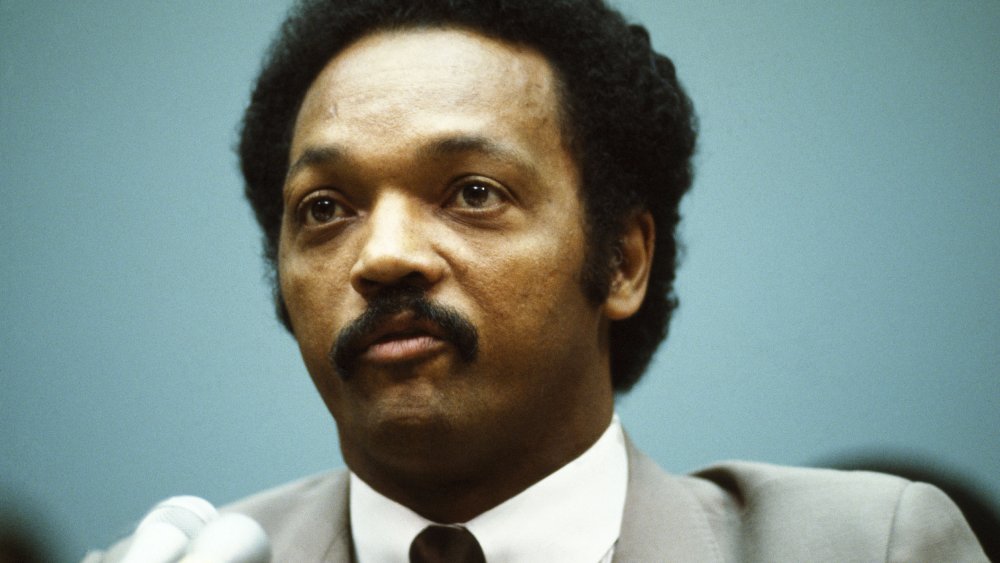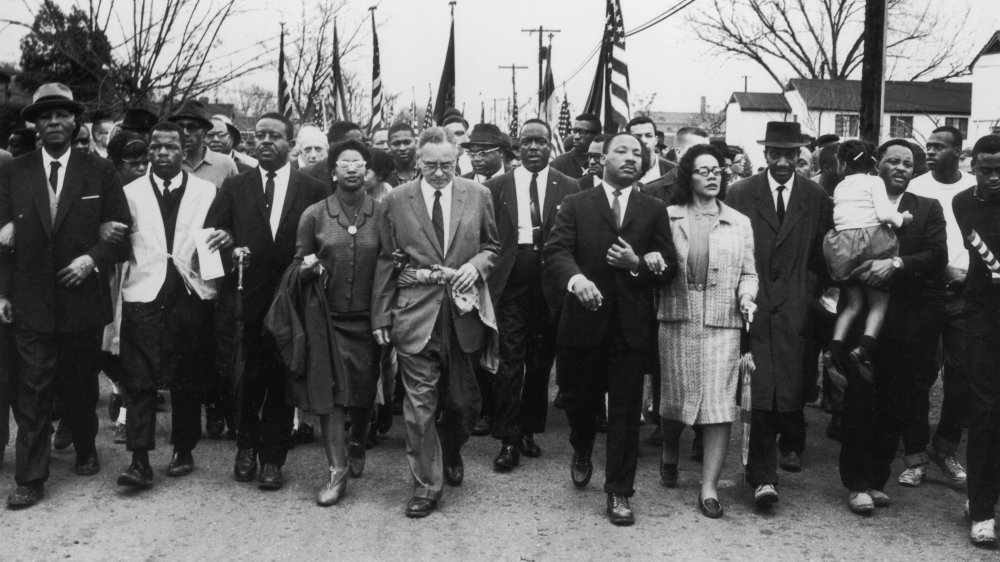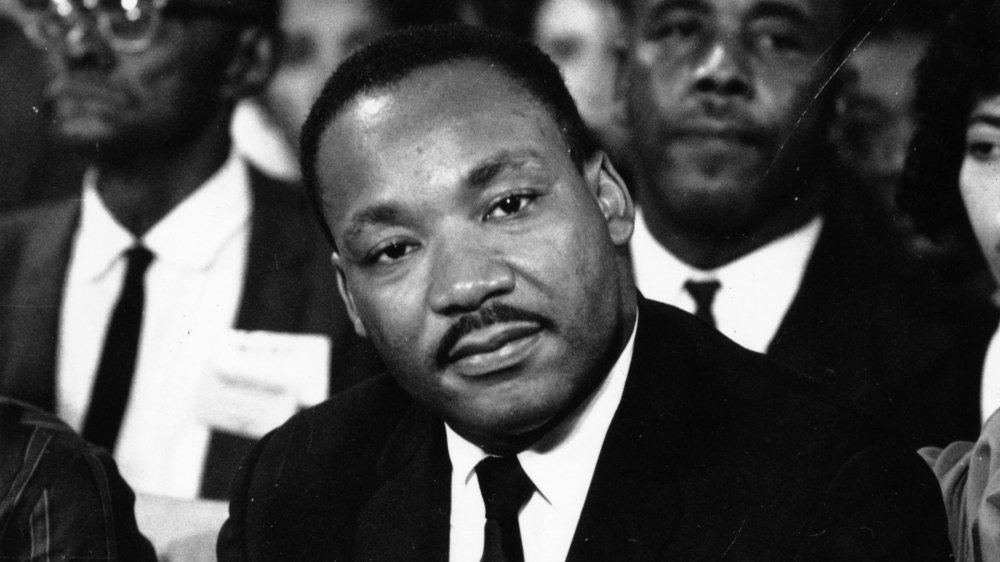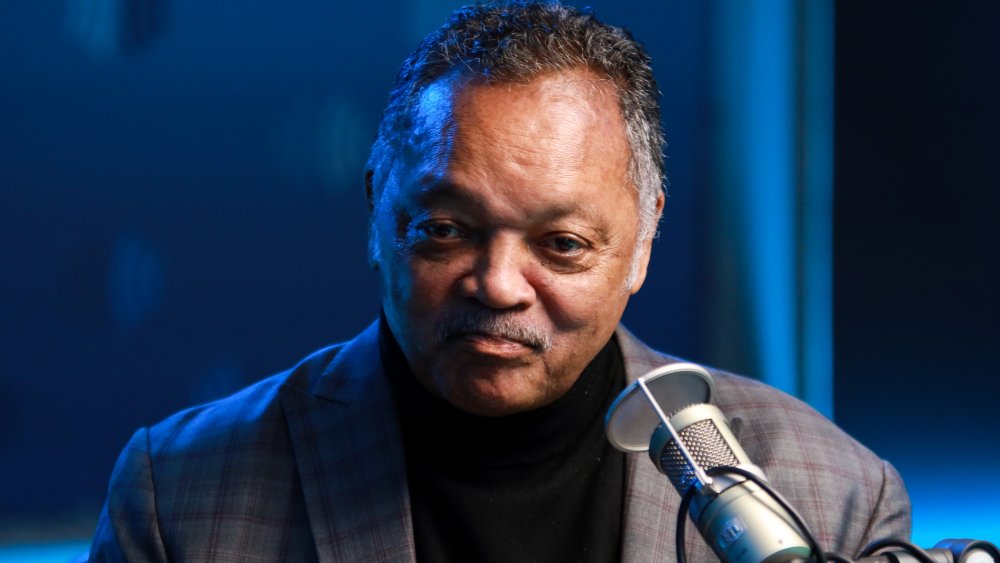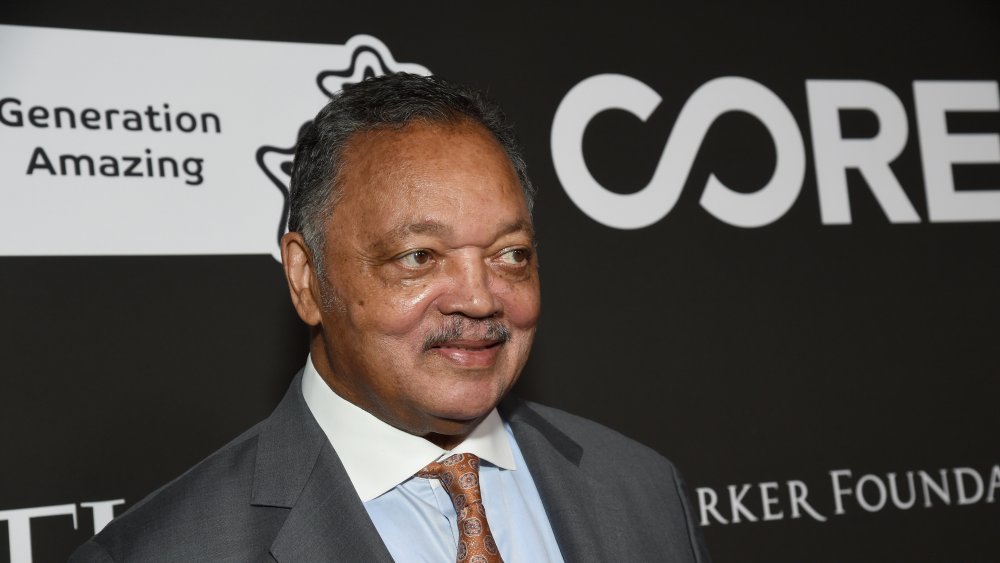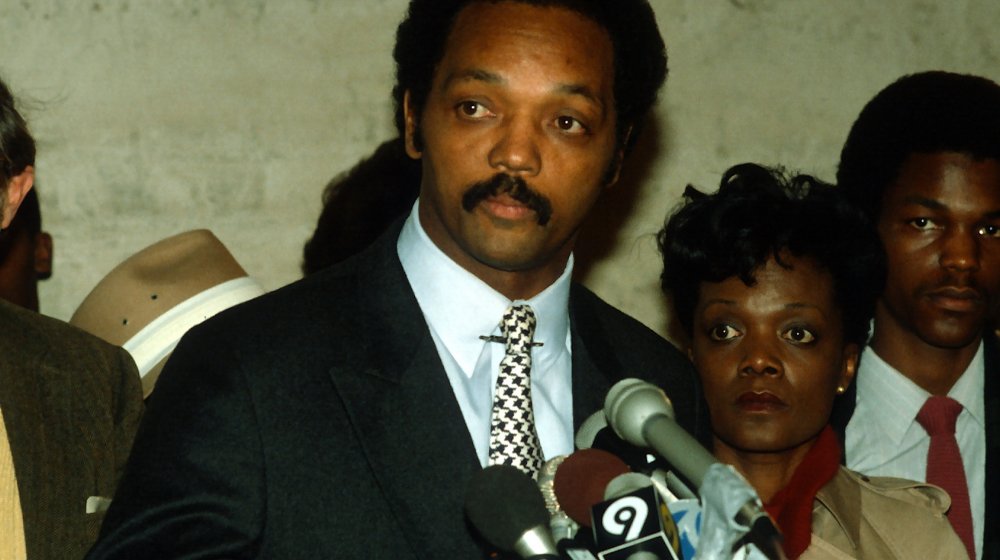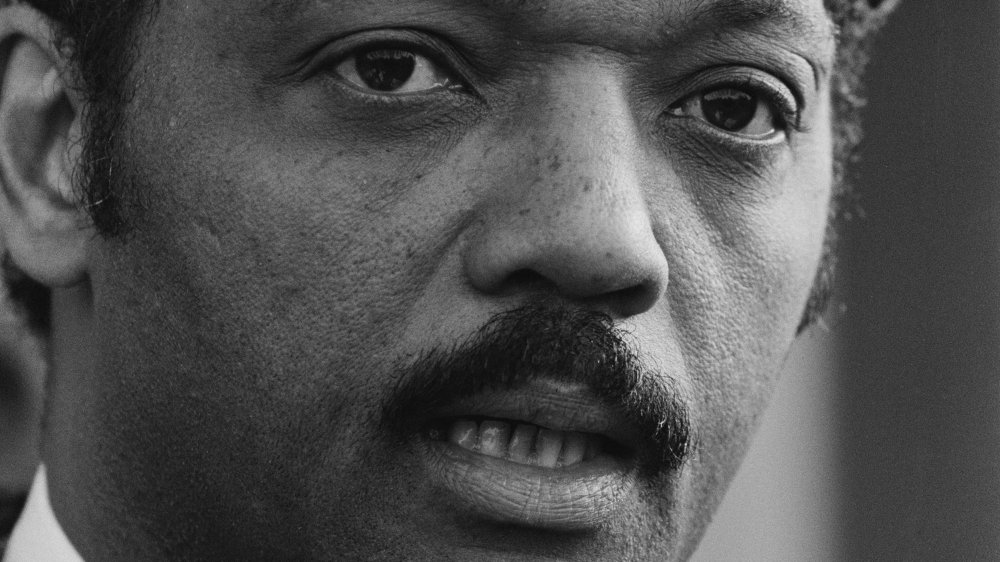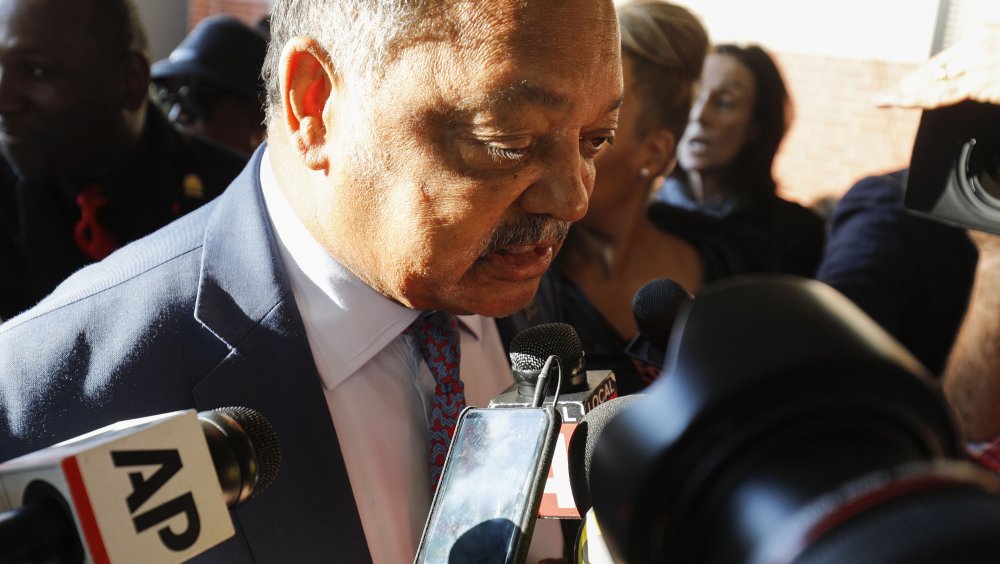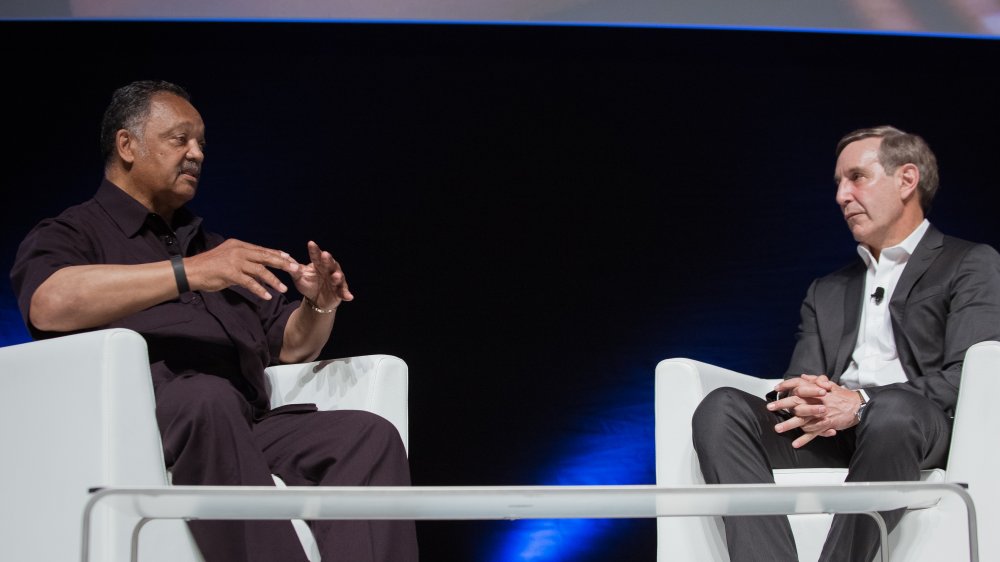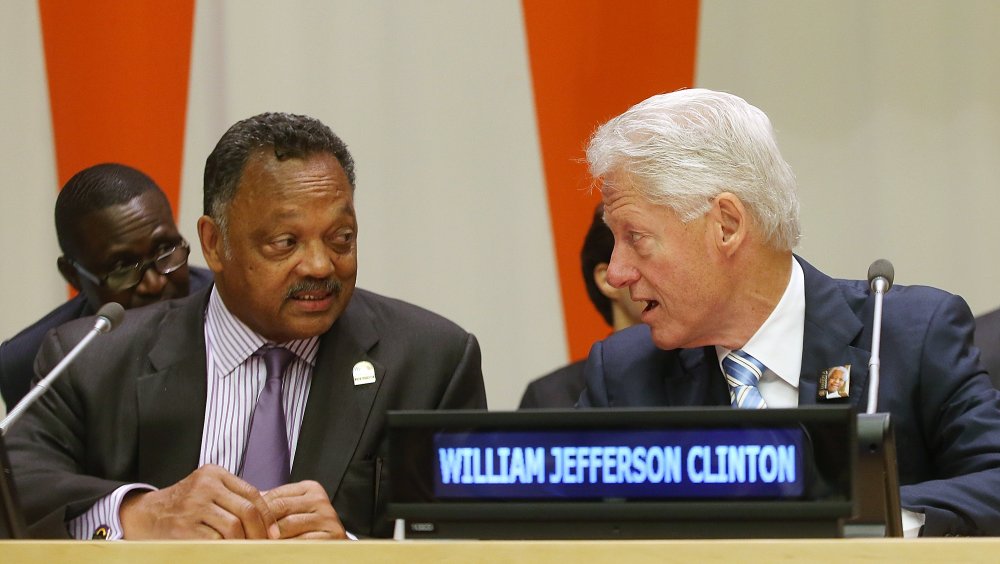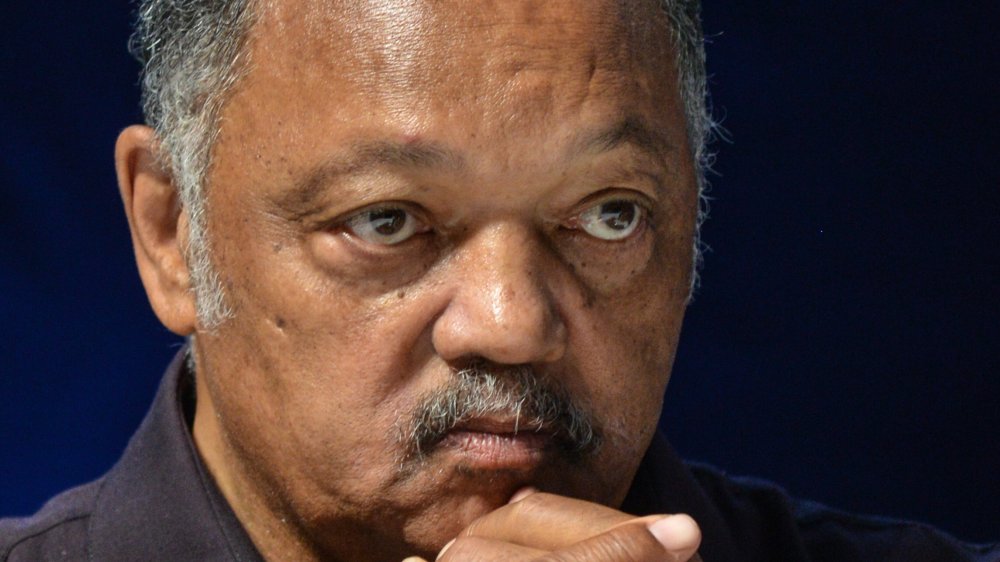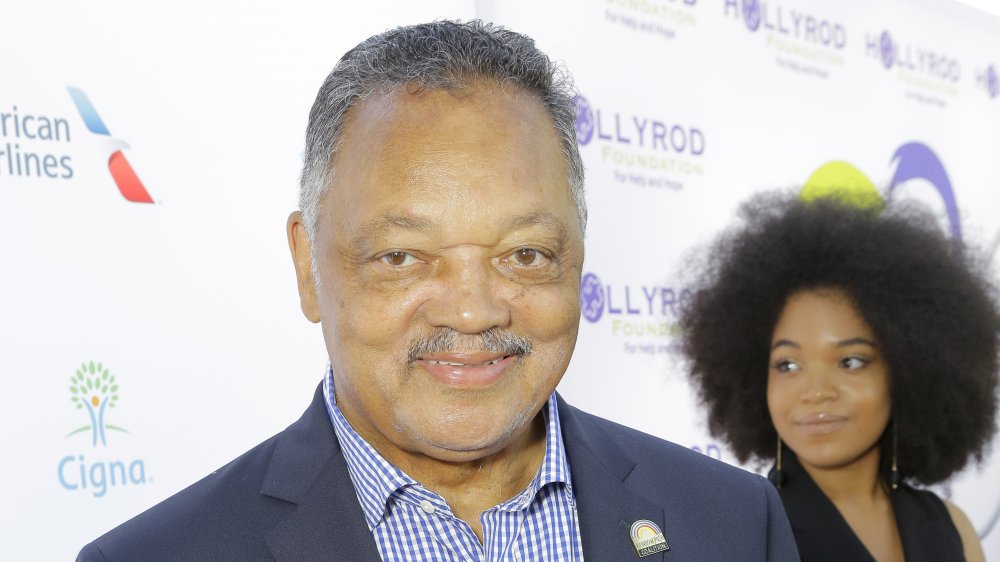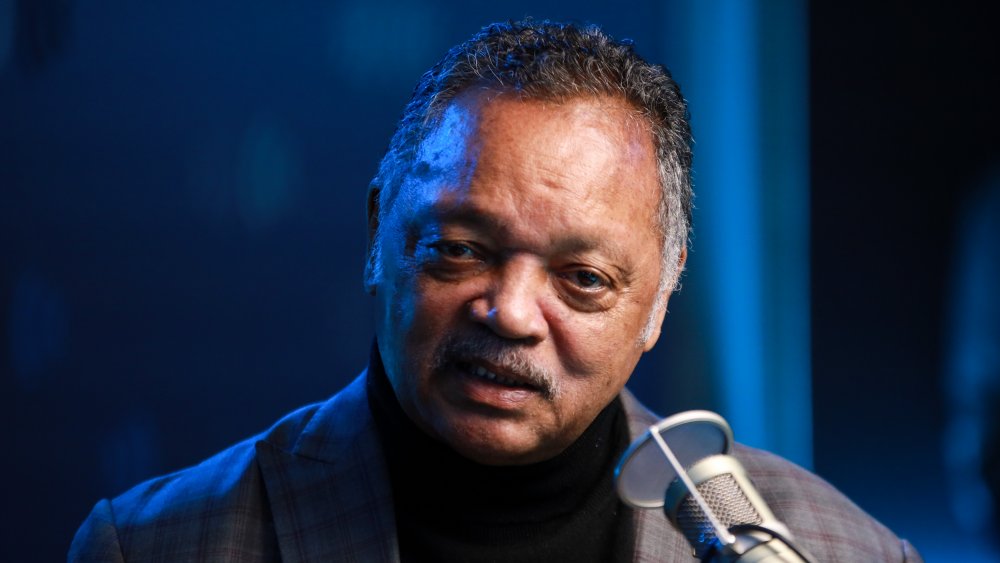The Crazy Real-Life Story Of Jesse Jackson
During the 20th century, Jesse Jackson became an essential advocate for civil rights and an important figure in American history. Jackson juggled multiple professions, creating decades of change for African Americans and promoting peace across cultures. Notably, he worked with Dr. Martin Luther King Jr., leading one of his organizations before creating his own to advance social justice and create opportunities for minorities.
During his career, Jackson would run for president, host television shows, write books, negotiate the releases of hostages, and become a Baptist minister. While Jackson would make many strides and break barriers, he would also make controversial decisions and say things that would get him in trouble over the years.
Born as Jesse Louis Burns on October 8, 1941, in Greenville, South Carolina, Jackson grew up in the segregated South. While Jackson and his mother would experience the hardships of racism, the future civil rights leader would excel in leadership and academics. According to PBS, while a student at North Carolina A & T, Jackson would lead civil rights demonstrations and eventually be arrested for "inciting to riot and disturbing the peace and dignity of the state." He wouldn't be swayed. Jesse Jackson kept pushing for civil rights as a young man, eventually graduating from college, beginning his theological studies, and joining Dr. King during one of the most crucial movements of the '60s.
When Jesse Jackson worked for Martin Luther King Jr.
In March 1965, while Jackson was studying at Chicago Theological Seminary, Dr. Martin Luther King Jr. was leading thousands of nonviolent demonstrators on a 5-day, 54-mile march from Selma, Alabama to the capital in Montgomery, Alabama. According to The Martin Luther King, Jr. Research and Education Institute, Jackson and a group of students drove down to Selma to join King in his march to campaign for voting rights.
In an interview with Graham Bensinger, Jackson said, "The Sunday that the march took place I was in school. I just came into the library and I looked on television and I saw the beating. I couldn't take it anymore. And I said to my classmates, 'If Jesus is real, we got to go to Alabama.' The cross is not just something to wear, something to bear, and I challenged their sense of theological commitment. And three cars of us drove from Chicago to Selma, Alabama. That's where I really met Dr. King."
Jackson asked King's closest friend and advisor, Ralph Abernathy, for a staff position with a Southern Christian Leadership Conference (SCLC) so he could organize a Chicago campaign. Ralph put in a good word for Jackson and King decided to give him a chance. Jackson eventually became King's protégé and began to lead Operation Breadbasket for SCLC, an economic development and empowerment program.
Jesse Jackson was present when Martin Luther King Jr. was assassinated
On April 4, 1968, Jesse Jackson witnessed the assassination of Martin Luther King Jr. at the Lorraine motel in Memphis, Tennessee. In an interview with The Guardian, Jackson still remembers the sound of the gunshot and the blood during the pivotal, tragic event in American history. "Every time I think about it, it's like pulling a scab off a sore," he said. "It's a hurtful, painful thought: that a man of love is killed by hate; that a man of peace should be killed by violence; a man who cared is killed by the careless."
Jackson was only 26 years old, the youngest of King's disciples. According to The Washington Post, the men were in the parking lot, only eight feet below King as they waited for him so they could go out to dinner. Jackson would fly back to Chicago only hours after the assassination, and the next day, gave a speech at a memorial session of the Chicago City Council. "I come here with a heavy heart because on my chest is the stain of blood from Dr. King's head," Jackson said. "He went through, literally, a crucifixion. I was there. And I'll be there for the resurrection."
Jesse Jackson created PUSH
After King's passing, Jesse Jackson kept busy with the civil rights movement. Jackson kept striving for equality and started to create his own legacy by stepping outside of King's shadow after leaving the SCLC in 1971. Jackson would soon form PUSH (People United to Save Humanity), an organization that enhanced the living conditions of African Americans by orchestrating corporate economic boycotts in order to advocate for more jobs and business opportunities. According to Encyclopedia, some of the corporations included Coca-Cola, Burger King, Kentucky Fried Chicken, Adolph Coors, Montgomery Ward, and Nike.
Jesse Jackson also focused on issues regarding housing, politics, welfare, education, and youth matters. By 1985, PUSH had received $6 million from the National Institute of Education of the Department of Health, Education, and Welfare, per Encylopedia. During Jackson's presidential bids in the '80s, PUSH also sponsored voter registration drives. Jackson eventually expanded the operation and used a subgroup called PUSH for Excellence (PUSH-EXCEL) to build up the self-esteem of young minorities and to keep teens interested in school.
Jesse Jackson wanted to empower all Americans with the National Rainbow Coalition
In 1984, Jackson founded another large-scale civil rights organization based in Washington, D.C. called the National Rainbow Coalition. The group was used to highlight third-party views in the conventional two-party political system and empowered minority groups such as African Americans, women, and homosexuals, among many others. According to Encyclopedia, Jackson used the rainbow as a metaphor for the diversity of the United States and spoke to every group of people while giving a speech at the 1984 Democratic National Convention in San Francisco.
The Rainbow Coalition extended its reach to international peace and used much of its efforts to advance domestic programs. In 1996, the National Rainbow Coalition merged with PUSH to create the Rainbow/PUSH Coalition with a mission to "protect, defend, and gain civil rights by leveling the economic and educational playing fields, and to promote peace and justice around the world," the program states on their official site.
Jessie Jackson made shocking antisemitic comments
According to the Washington Post, in 1984, Jesse Jackson odiously referred to Jews as "Hymies" and to New York City as "Hymietown" while having a conversation with Black Washington Post reporter, Milton Coleman. Jackson didn't think his offensive slurs would be included in the Post due to both men sharing the same ethnicity. However, Coleman allowed it to be printed by another reporter who was covering Jackson's relations with American Jews.
Following the antisemitic remarks, Jesse Jackson was met with protest and heavy public criticism. His response only made things worse. The civil rights leader voiced his outrage instead of quelling the situation and making an apology. During a radio broadcast featuring Louis Farrakhan, the Nation of Islam leader brought the tense situation to an unprecedented level by making a public warning to Jews, saying: "If you harm this brother [Jackson], it will be the last one you harm."
After more outrage from the public and press, Jesse Jackson course-corrected. Jackson gave an emotional speech and apologized to national Jewish leaders in a Manchester, New Hampshire synagogue, per the New York Times.
Jesse Jackson ran for president twice
Jesse Jackson sought the Democratic Party's nomination for president twice in 1984 and 1988. A former high school class president who would go on to lead historical civil rights organizations under Dr. King and create more himself, Jackson seemed destined to aim higher and eventually run for president of the United States. According to Biography, Jackson further developed his political involvement in the late 1970s by mediating problems in places such as South Africa and the Middle East.
By 1984, Jackson would throw his hat into the ring and make history by being the second African American to run a national campaign for the U.S. presidency. According to The Martin Luther King, Jr. Research and Education Institute, Jackson would finish third and get 3.5 million votes which helped register a million new voters. In 1988, he would run for president again. According to Intercept, some opponents thought Jackson's nomination might lose support from a crucial portion of white voters; however, Jackson was able to win certain states with larger numbers of Reagan Democrats and white voters, and eventually was backed by Bernie Sanders who helped Jackson secure Vermont, a predominantly white state. After a long round of campaigning through dozens of American cities and many debates, Jackson would finish second in the Democratic primaries to Massachusetts Governor Michael Dukakis. Jackson would also garner more than 7 million votes, twice as many as his first run for president.
Jesse Jackson negotiated hostage releases in foreign countries
Jesse Jackson made many sacrifices and took his activism to a new level by negotiating hostage releases in foreign countries. According to USA TODAY, Navy Lt. Robert Goodman had taken hostage by Syria after his plane was shot down while flying over Lebanon. The Reagan administration was skeptical but Jackson and his delegation of ministers were confident they could bring Goodman home. So, Jesse Jackson and the delegation traveled to the Middle East to begin negotiations. On January 4, 1984, after spending a month in captivity, Goodman was freed by the help of Jackson.
In 1990, Jackson negotiated the release of 24 women, 12 children, and 11 men who were held captive or hiding in Iraq and Kuwait following Iraq's August 2nd invasion of Kuwait, the Chicago Tribune reported. Jackson was able to persuade former Iraqi President Saddam Hussein to lessen bureaucratic restrictions that could have prevented the promised release of the hostages.
Jesse Jackson's diplomatic efforts continued when, in 1999, he negotiated yet another release of three soldiers who had been held captive for over a month in Yugoslavia, per the New York Times. When senior Clinton administration officials asked Jackson not to go, the determined civil rights leader showed defiance and stayed true to his mission. After negotiations, Jackson was able to make the seemingly impossible happen when he convinced President Slobodan Milosevic of Yugoslavia to let the men go free.
Jesse Jackson worked in almost every industry of the media
Jesse Jackson would eventually gravitate towards the media, harnessing it to speak to his followers and to further his reach, both across the nation and abroad. The New York Times reported that Jackson's first show, Jesse Jackson, faced an uphill battle during the times of "Oprah, Phil, and Geraldo," who were leading talk show ratings. "If they look for the weekend TV show to discuss civil rights 1990, this is the only place they'll see it discussed in-depth," Jackson said. "For us to be able to discuss this matter for an hour is significant." After two years of hosting the show, and working out the kinks, Jackson would go on to host a more successful show that would run for nearly a decade.
According to the Rainbow/Push Coalition, Jackson hosted "Both Sides With Jesse Jackson" on CNN from 1992 to 2000; he wrote weekly columns syndicated by the Chicago Tribune/Los Angles Times; Jackson wrote two books: Keep Hope Alive, and Straight From the Heart; and he co-authored the books Legal Lynching: Racism, Injustice, and the Death Penalty and It's About The Money with his son Jesse L. Jackson, Jr. The civil rights leader would also go to host a radio talk show called Keep Hope Alive with Reverend Jesse Jackson, which is broadcast every Sunday in nearly 40 markets including New York City, Los Angeles, Chicago, and San Francisco.
Jesse Jackson was awarded the Presidential Medal of Freedom
Believe it or not, President Bill Clinton and Jesse Jackson have a long history dating back to 1992, when they had beef over the controversial remarks of a rapper. Clinton was mad that Jackson invited rapper Sister Souljah to join a panel discussion for his Rainbow Coalition after Souljah had made racist comments about the Los Angeles riots, reported The Washington Post. After the controversial Sister Souljah interview appeared in The Post, Clinton was so upset by her words, he decided to hold off on commenting until when he was before Jackson's group. Clinton questioned Jackson's judgment and scolded the civil rights leader for the invitation. Two days later, in an interview, Jackson was still mad, saying: "He was invited to our house as a guest, and he used the platform to ... embarrass us."
Time seemed to heal their wounded relationship as Clinton and Jackson would eventually make up. In 1998, Clinton would rely on Jackson for counseling during the impeachment hearings after his affair with Monica Lewinsky. The New York Times mentioned the ordained minister would spend a weekend praying with the Clintons, trying to give them wisdom and the ability to stick together as the press and public tore them apart. Two years later, Jackson would also go on to lead an anti-impeachment rally in Washington, D.C. That same year, President Clinton awarded Jesse Jackson the Presidential Medal of Freedom, the nation's highest civilian honor, following Jackson's help.
Jesse Jackson fathered a child out of marriage
In January 2001, Jackson revealed that he had an extramarital affair that resulted in the birth of a daughter, the New York Times reported. Jackson admitted that his child, 20 months old at the time, was given "emotional and financial support" since her birth. "As her mother does, I love this child very much," he said.
"I was born of these circumstances, and I know the importance of growing up in a nurturing, supportive and protected environment," Jackson said. "So I am determined to give my daughter and her mother the privacy they both deserve."
Jackson had the affair with a woman who worked for his group the Rainbow/PUSH Coalition. The press drew parallels to Jackson's support of Clinton following his impeachment hearings for having an affair. Jackson announced he'd be going on an indefinite hiatus from his activist work, saying he needed the time to revive his spirit and reconnect with his family and wife Jackie.
Jesse Jackson was diagnosed with Parkinson's disease
In November 2017, at the age of 76, Jesse Jackson revealed he was diagnosed with Parkinson's disease. According to NBC News, the disease "is commonly associated with tremors, stiffness, and difficulty with walking and balancing." There is still no known cure. Northwestern Medicine in Chicago said Jackson was being treated as an outpatient and had originally been diagnosed with the disease in 2015.
"My family and I began to notice changes about three years ago," Jackson said in a statement. "After a battery of tests, my physicians identified the issue as Parkinson's disease, a disease that bested my father."
"Basically he's got an advanced age, and he's got a family history of Parkinson's, so that's going to make his outlook worse," medical correspondent Dr. John Torres told NBC News. "What's going to make it better is more physical activity, family and social support and appropriate medication to slow the symptoms. But eventually, the disease going to catch up with him."
Jesse Jackson urged President Trump to pardon former governor Rod Blagojevich
In 2019, The Chicago Tribune reported that Jesse Jackson and his son, former U.S. Representative Jesse Jackson Jr., wrote a letter to President Donald Trump to ask for the release and full pardon of former Illinois Governor Rod Blagojevich. In 2011, Blagojevich was convicted of trying to sell the U.S. Senate seat vacated by Barack Obama after the latter became president in 2008. According to Reuters, Jackson's son was called as a witness during the trial. He admitted he was interested in the senate seat but denied offering political cash to pay-for-play.
"We stand with his family as they seek a full pardon for a father and husband that has served most of a sentence that was far longer than the offense deserved," both men wrote to Trump in an attempt to get Blagojevich pardoned.
Per CNN, in 2020, Trump commuted the prison sentence of Blagojevich, who had served eight years of a 14-year sentence. "He served eight years in jail, a long time. He seems like a very nice person, don't know him," Trump told reporters.
